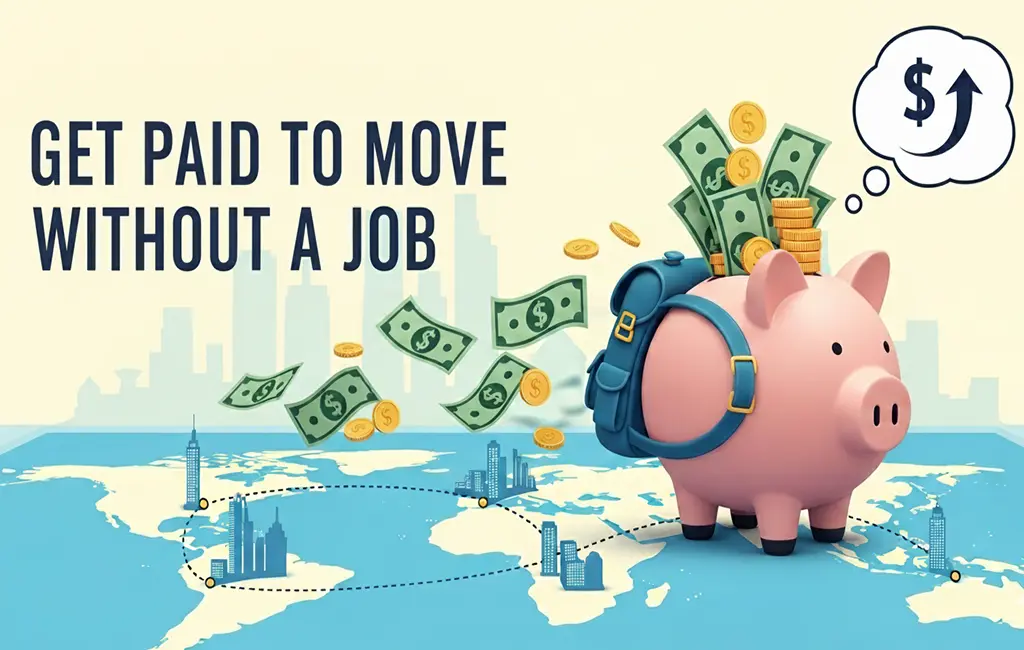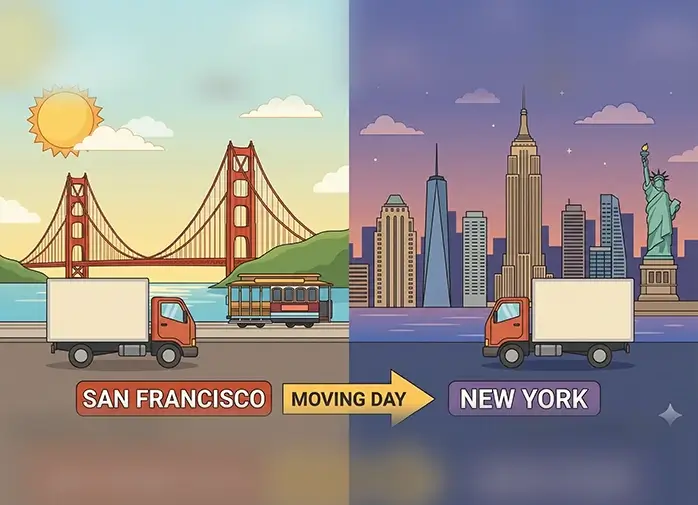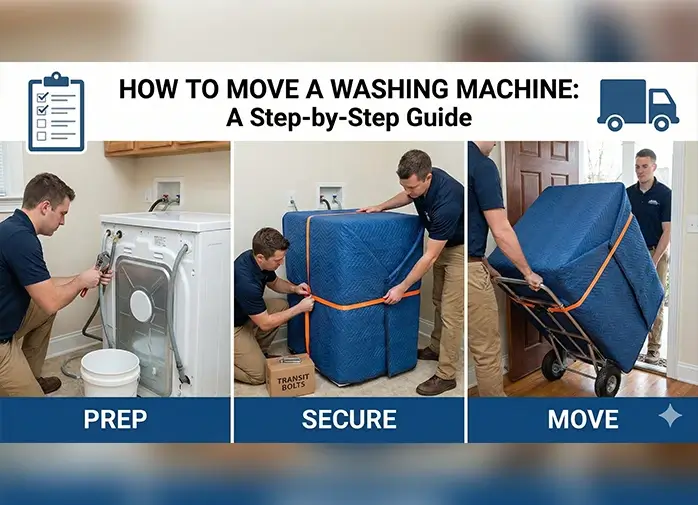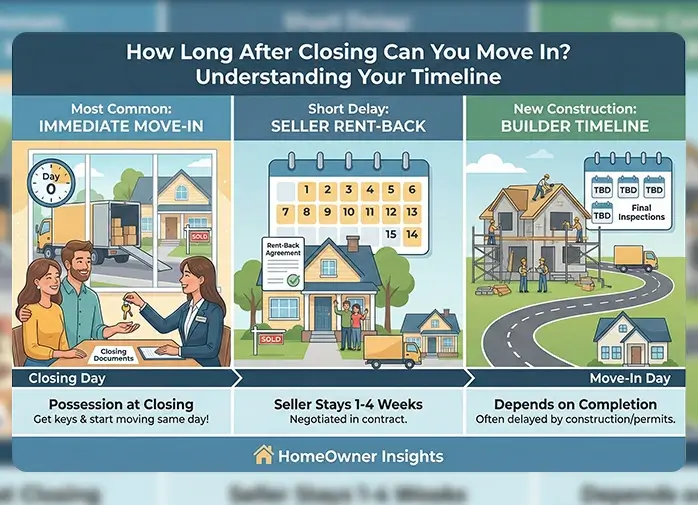Get Paid to Move Without a Job – Relocation Incentives Explained

Moving Without a Job—Fantasy or Reality?
Imagine getting paid just to relocate to a new city—even if you don’t already have a job waiting for you. Sounds too good to be true, right? Surprisingly, it’s a growing reality in the U.S. Many cities and states are offering relocation incentives worth thousands of dollars to attract new residents.
Why? Communities hit by population decline, worker shortages, and economic slowdown want fresh energy, especially from remote workers and freelancers. In return, they’re willing to cover part of your moving costs—or even hand you a check—to make the move worthwhile.
Quick answer: Yes, you can get paid to move without a job. Relocation incentives typically range from $5,000 to $20,000, and some states even pay annual dividends just for living there.
This guide breaks down why cities do this, the top programs in 2025, how you can qualify, and whether it makes sense to pack up without a guaranteed paycheck.
Why Cities Pay People to Move?
At first glance, paying people to move sounds strange. But when you look closer, it’s a smart strategy for struggling or underpopulated communities.
- Economic Revitalization: Many smaller towns and mid-sized cities have lost residents to big metro areas. Incentives encourage people to return, filling homes and boosting local businesses.
- Attracting Remote Workers: With more Americans working from home than ever, location matters less. Cities like Tulsa, OK, saw an opportunity: bring in high-earning professionals who don’t need local jobs but still spend locally.
- Strengthening Housing Markets: Some states have housing surpluses. Offering cash or grants helps attract buyers and renters.
- Boosting Local Culture & Workforce Diversity: A fresh wave of young professionals can breathe life into communities, drive innovation, and keep schools and services thriving.
In short: cities pay you because they’re investing in their own survival and growth.
Can You Really Move Without a Job?
The short answer: Yes, if you have a financial cushion or remote/freelance income.
Most incentive programs don’t require you to have a traditional job lined up in the new location. Instead, they often ask:
- Do you work remotely, freelance, or own a business that’s location-independent?
- Do you have sufficient savings or income to support yourself?
- Are you willing to commit to living in the city for 1–2 years?
For example, Tulsa Remote doesn’t ask for a job in Oklahoma. They just want proof that you can sustain yourself financially. Similarly, Vermont and West Virginia offer grants to people who bring remote jobs with them.
So while you can move without a local job, you’ll still need some form of stable income or savings to qualify.
Top U.S. Cities & States that Get Paid to Move Without a Job in 2025
Tulsa, Oklahoma – Tulsa Remote Program
- Incentive: $10,000 cash + free coworking space + networking support.
- Eligibility: Must work remotely or freelance. No local job required.
- Why It’s Popular: Tulsa was one of the first major success stories, attracting thousands of young professionals and revitalizing the downtown area.
Vermont – Remote Worker Grant Program
- Incentive: Up to $7,500 reimbursement for relocation expenses.
- Eligibility: New residents working remotely for out-of-state employers.
- Highlight: Great for those who want a quieter lifestyle with access to New England culture.
West Virginia – Ascend WV Program
- Incentive: $12,000 cash + free outdoor recreation perks worth $2,500.
- Eligibility: Remote workers, freelancers, or entrepreneurs.
- Why It Works: West Virginia markets its natural beauty as much as the cash.
Alaska – Permanent Fund Dividend (PFD)
- Incentive: Annual cash payments, usually $1,000–$2,000 per resident.
- Eligibility: Live in Alaska full-time for at least a year.
- Highlight: You don’t need a job to qualify—just residency.
Other Notable Programs
- Kansas Rural Opportunity Zones: Student loan repayments up to $15,000 + tax breaks.
- Northwest Arkansas “Life Works Here”: $10,000 cash + free mountain bike.
- Michigan & Ohio small-town programs: Grants and housing subsidies to attract new residents.
👉 These programs prove that you don’t need a local job offer to relocate. Remote work, freelancing, or savings can be enough.
How to Qualify for Relocation Incentives Without a Job?
Each program has its own rules, but here are common requirements:
- Proof of Income: Even if you don’t have a job, showing freelance contracts, passive income, or savings reassures programs you can stay afloat.
- Residency Commitment: Most require at least 1 year, sometimes 2.
- Housing Requirement: You usually need to rent or buy within city limits.
- Age & Background Checks: Some programs target young professionals (21–45), while others are open to all.
- Community Involvement: A few programs ask for participation in local events or volunteer work.
Tip: Apply early. These programs often have limited spots each year and thousands of applicants.
Pros and Cons of Moving Without a Job
Pros:
- Financial help to offset moving costs.
- Opportunity to explore new communities.
- Lower cost of living in many incentive cities.
- Chance to network and grow remote/freelance work.
Cons:
- Job security risks if you rely only on savings.
- Cultural adjustment to smaller/rural communities.
- Programs usually require at least a year-long stay.
- Incentives may not fully cover long-distance moving costs.
Bottom line: Moving without a job can work, but you need a safety net.
Steps to Take Before Moving Without a Job
Build an Emergency Fund
Save at least 3–6 months of living expenses before moving. This cushion covers rent, bills, and food while you look for work or settle into a new income stream.
Research Cost of Living
Incentives stretch further in states with affordable housing and lower daily costs, you also have options to calculate cost of moving before relocating, like Arkansas or West Virginia. Compare rent, groceries, and utilities before choosing a location.
Secure Housing in Advance
Most relocation programs require proof of a local address. Locking down housing early also prevents last-minute stress and higher moving expenses.
Explore Remote Work Options
Even part-time freelancing or gig work can help you meet incentive program requirements. Remote income ensures stability while you job-hunt locally.
Plan Health Insurance & Benefits
Without employer coverage, you’ll need independent health insurance. Research state exchanges or national providers to avoid gaps in essential coverage.
Alternatives to Relocation Incentives
Employer-Sponsored Relocation Packages
If you secure a job, many companies provide relocation assistance, covering moving costs, temporary housing, or travel expenses.
Student Loan Forgiveness Programs
Some towns and states offer to pay off a portion of your student loans if you relocate and commit to staying for a few years.
Military & Government Relocation Assistance
Qualified individuals may receive full or partial moving support through military programs or government housing relocation benefits.
Co-living & Shared Housing
Shared housing communities help cut upfront rent and utility costs, making moving more affordable even without formal incentives.
Tips to Make Relocating Without a Job Work
Network Immediately
Join local meetups, community groups, and coworking spaces to build connections and discover job leads faster.
Take Side Gigs
Freelancing, delivery driving, or part-time work can bridge the gap while you search for a long-term position.
Stick to a Budget
Track spending closely and avoid splurging your savings or bonuses on luxuries before income stabilizes.
Think Long-Term
Choose a city where the cost of living, lifestyle, and job market align with your goals—not just the size of the relocation check.
Conclusion
Yes—it’s possible to get paid to move without a job. Cities and states across the U.S. are using cash incentives, free housing perks, and tax breaks to attract new residents.
But success depends on planning: having savings, researching programs, and choosing a location that aligns with your lifestyle. Whether it’s $10,000 from Tulsa, $12,000 in West Virginia, or $1,000+ yearly in Alaska, relocation incentives can help you start fresh without traditional employment.
If you’re considering a move, don’t just chase the biggest payout—find the program and place that fits your long-term goals.
FAQ
Q1. What state pays you to move there without a job?
Several do, but the most popular are Oklahoma (Tulsa Remote), Vermont, and West Virginia (Ascend WV). These programs only require proof of income—not a local job.
Q2. What state is offering $20,000 to move there?
Currently, West Virginia’s Ascend WV program offers up to $12,000 in cash plus perks worth around $8,000, bringing total benefits close to $20,000.
Q3. Is it true that places will pay you to move there?
Yes. From Alaska’s annual dividend to city grants in Kansas, Arkansas, and Michigan, many places offer relocation incentives to attract residents.
Q4. Do you get $1,000 for living in Alaska?
Yes. Alaska’s Permanent Fund Dividend (PFD) typically pays residents $1,000–$2,000 per year, simply for maintaining state residency. No job required.
Categories
- Long Distance Moving154
- Local Moving120
- Commercial Moving40
- Residential Moving34
- Last – Minute Moving25
- Moving Tips & Lifestyle10
- Furniture Moving9
- Moving Tips & How-To Guides8
- Moving services7
- Moving Cost5
- Moving Cost Calculator5
- Moving Costs & Budgeting5
- moving tips4
- state to state movers4
- Piano Moving3
- Car Transportation3
- Truck Rental3
- Local Move3
- Moving companies3
- best moving rates3
- cheap moving companies3
- affordable moving companies3
- full-service movers3
- Moving3
- Moving Tips3
- Moving Cost Guides3
- Junk Removal2
- Moving Container2
- Senior Moving2
- Senior Relocation Moving Companies2
- Moving Tools2
- Moving Estimates2
- interstate moving2
- College Moving2
- Dorm Moving2
- Tips for moving2
- cross-country move2
- International moving2
- Household moving2
- Relocation Guide2
- Moving Tips & State Guides2
- Moving Tips & Planning2
- Heavy Equipment1
- Senior Moving Services1
- office moving1
- office relocation1
- employee relocation1
- Car Transport1
- Vehicle Shipping1
- Car Shipping Services1
- Artificial Intelligence1
- Office Moving Services1
- Commercial Moving Companies1
- Corporate Moving Services1
- Corporate Movers1
- full-service moving companies1
- sustainable moving companies1
- green movers1
- Moving in US1
- Best places to move in 20251
- 2025 moving1
- Full-Service Moving Companies1
- College moving services1
- Moving to College1
- Moving Season1
- Spring Moving1
- donate1
- sell1
- Movers in California1
- Movers in Studio City1
- Moving to California1
- Laws about Moving into California1
- Moving Laws1
- House moving1
- packing1
- cheap moving ways1
- Moving guide1
- moving across countries1
- international relocation program1
- move out cleaning1
- right packing supplies1
- pack while moving1
- Apartment moving1
- PODS1
- moving out1
- state to state move1
- California movers1
- Truck Rental1
- US Territory Relocation1
- International Moving1
- Long-Distance Moving1
- Shipping & Moving Tips1
- Moving Budget Guide1
- Relocation Guides & Incentives1
- Moving Tools & Equipment Guides1
- Moving Services & Options1
- Moving Tips & How-To Guides1
- Moving Day & Settling In1
- Mobile Home Moving1
- Moving Guide & Tips1
- Moving Tips & State Comparisons1
- Moving Tips & City Guides1
- Moving Tips & Cost Guides1
- Long-Distance Moving Tips1
- Moving Tips & Financial Planning1
- Moving Tips & Home Preparation1
- Vehicle Shipping & Auto Transport1
- Marketing & Lead Generation1
- International Moving Guides1
- Moving Costs1
- San Francisco Moving Guide1
- NYC Moving1
- Local Movers1
- Budget Moving1
- Student Moving1
- Affordable Moving1
- Specialty Moving Guides1
- Local & Long-Distance Moving1
- Boston Moving Guide1
- Europe Relocation Guide1
- Moving Costs & Specialty Moving1
- Cost of Living1
- Relocation1
- International Moving1
- Moving Guides1
- Lifestyle & Relocation1
- State Guides1
- Home Buying Guide1
- Moving Timeline1
- Real Estate Tips1
- Appliance Moving1
- Packing & Preparation1
- Interstate Relocation1
- City-to-City Moving Guide1

 Local Movers
Local Movers Last-Minute Movers
Last-Minute Movers Junk Removal
Junk Removal Long Distance Movers
Long Distance Movers Piano Movers
Piano Movers Heavy Equipment
Heavy Equipment Commercial Movers
Commercial Movers Moving Container
Moving Container Car Transportation
Car Transportation Furniture Movers
Furniture Movers Truck Rental
Truck Rental Moving Cost Calculator
Moving Cost Calculator Moving Planner
Moving Planner Packing Calculator
Packing Calculator Moving Checklist
Moving Checklist Moving Insurance
Moving Insurance FAQ
FAQ Contact Us
Contact Us Moving Loan
Moving Loan About Us
About Us











